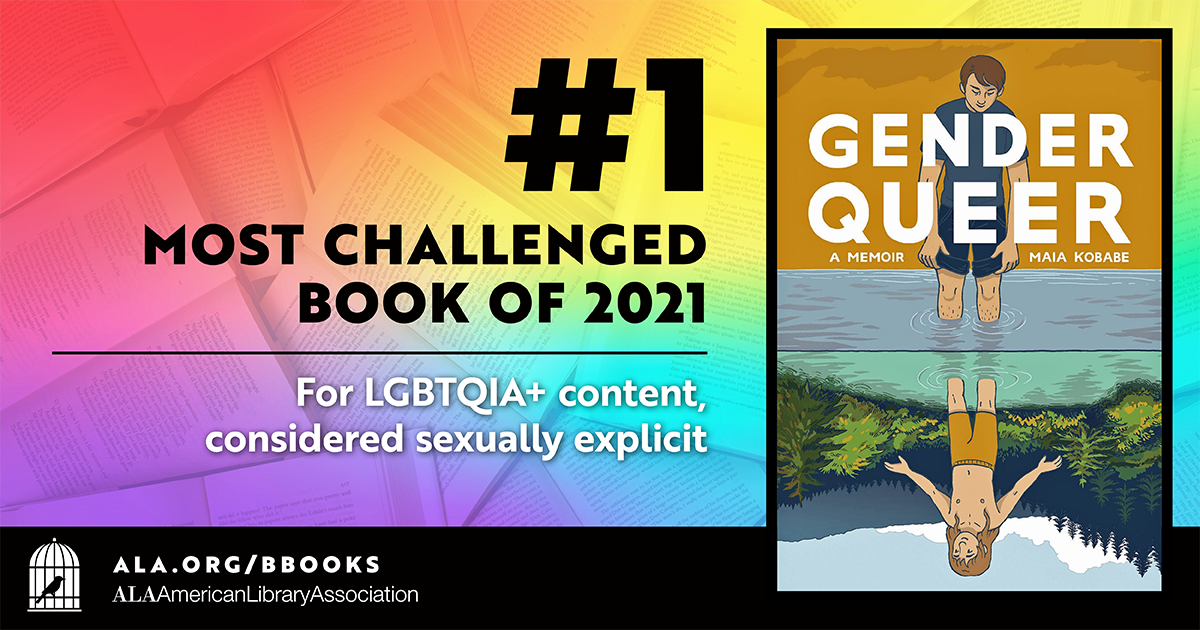A reflection on Maia Kobabe’s Gender Queer
Reading AudaciouslyAmy L. Dalton
Published 25 September 2024

On top of the list of the ten most banned books for the last three years has been Maia Kobabe’s Gender Queer, an autobiographical graphic memoir.[1] The work was also recently cited by Oklahoma State Superintendent of Education Ryan Walters as “not on the same plane” as the Bible, when he was asked why he didn’t ban the Bible if he was concerned with banning material that is filled with sexuality and violence.[2] He went on to disparage the book as “pornography” — which honestly makes me wonder if he has even read it, as the protagonist in this memoir is mostly uninterested in sex. This lack of interest in fact is one of the main dilemmas that prompts the journey of identity questioning and self-exploration documented in its beautifully illustrated pages.
I experienced a great deal of biblical resonance in the easy-to-read text. In order to see these resonances, I imagine one has to move past a discomfort with discussions of physical body parts, and be able to differentiate healthy engagement of our physical selves from “lust” and “pornography.” Folks who have sought to ban Gender Queer have not yet done this. Reading Kobabe’s memoir might help them to do so, as the candor and personal integrity with which e relates eir efforts to understand eir body, mind and spirit (using here the Spivak pronouns[3], per Kobabe’s preference) seem to me impossible to misunderstand – IF the text is actually read in full! Another text that might be helpful on this journey is Song of Songs, or Song of Solomon. Laced with explicit and provocative sexual innuendo, the quality of heartfelt pursuit of authentic connection that runs through Kobabe’s memoir also runs through this sacred scripture.
I also experienced biblical resonance in Gender Queer mediated by a song, which came to my mind several times as I read: “Simple Gifts” by the Shaker elder Joseph Brackett. A widely sung and deeply beloved song both within and beyond formal church settings, many are unaware that it has its roots in a Christian movement that since the 16th century has espoused complete equality of the sexes, eschewed procreation, and practiced universal celibacy. There are surely many differences between the Shakers and Kobabe’s journey, but the commonality I see is that both find gender, as it functions in society and in traditional sexual relations, to be a “complexity” that gets in the way of the journey toward authenticity.
I experienced resonance with “Simple Gifts” at many points throughout the book, but most strongly was on page 191 where Kobabe compares the experience of androgyny, or having no gender identity, as like a “wild forest” that is found between the mountains and the sea. “This is where I want to make my home,” e writes. This reminds me of the line in Simple Gifts:
And when we find ourselves in the place just right,
‘Twill be in the valley of love and delight.
Both the valley and the wild forest are “third spaces” or “spaces between” wherein the fixations of the world, which so often race madly toward polarized/-ing binaries, can be transcended entirely. Both Brackett’s song and Kobabe’s book capture the level at which this space is a sanctuary for those who seek it. That societal momentum that keeps pushing us toward polarizing identities and experiences is painful for everyone, but some more sensitive souls are more in touch with how deeply compromising it is. For some, it is gender binaries that raise this awareness; for others, other binaries weigh heavily and painfully until we find and forge ways to live beyond their constraints.
I think this is the same possibility that the apostle Paul was trying to impart to the Galatians when he wrote that within the Christ movement, “there is no longer Jew or Greek, there is no longer slave or free, there is no longer male and female; for all of you are one in Christ Jesus” (Galatians 3:28). This passage is often oversimplified: it is not just that all of these “types” are welcome. Its that if we are to live the way we are meant to live, we must rise completely above the fixation toward bifurcating categorization itself. In her book Galatians Re-Imagined, New Testament scholar Brigitte Kahl addresses how Paul’s now-famous words represent “an apocalyptic subversion (or, to use [J. Louis] Martyn’s term, ‘invasion’) of the old cosmos by a nonbinary ‘new creation’”[4]. Kahl emphasizes that Christians have mostly underestimated how extremely difficult this was and is to actually live out. Worth the deep dive it demands, this book helps us clarify the level of change in human culture is necessary if we are to find our way out of Other-based identity formations.
Understanding this (albeit through a glass darkly), I welcome the transformation and testimony of brave souls like Kobabe as to how deeply they had to dive in order to find their way to the blessed and beautiful “third space.” May we take the time and heart to learn from them!
References:
1- https://www.ala.org/bbooks/frequentlychallengedbooks/top10 and https://www.ala.org/bbooks/frequentlychallengedbooks/top10/archive
2- https://www.foxnews.com/media/oklahoma-schools-chief-spars-cnn-host-over-teaching-bible-classrooms-heated-interview
3- https://en.wikipedia.org/wiki/Spivak_pronoun
4- Brigitte Kahl, Galatians Re-Imagined (2010), p20. https://www.jstor.org/stable/j.ctv19cwb7n
